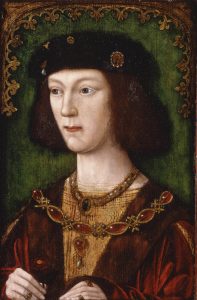 On this day in history, 27th June 1505, Henry, Prince of Wales, the future Henry VIII, renounced his betrothal to Catherine of Aragon, his brother’s widow, claiming that it had been contracted without his consent.
On this day in history, 27th June 1505, Henry, Prince of Wales, the future Henry VIII, renounced his betrothal to Catherine of Aragon, his brother’s widow, claiming that it had been contracted without his consent.
The couple had been betrothed since 25th June 1503 and, according to the terms of the marriage treaty negotiated between Henry VII and Isabella and Ferdinand, were due to have the marriage solemnised on Henry’s fourteenth birthday, i.e. 28th June 1505. The young Henry was, therefore, renouncing the betrothal just the day before the marriage was set to take place.
Was it young Henry’s idea?
Well, it’s impossible to say, but David Starkey believes that Henry “had agreed to marry Catherine because his father told him too, and that he reneged on his promise for the same reason.”1 As Starkey points out, after Isabella I of Castile’s death in November 1504, “Catherine the daughter of Ferdinand of Aragon was a much less attractive proposition as a daughter-in-law than Catherine the daughter of the Catholic kings of Spain” because Isabella’s heir had not been Ferdinand, but her daughter Juana, wife of Archduke Philip of Burgundy. Catherine was not quite the catch she had been. Of course, when young Henry was free to choose his own wife, following the death of his father in April 1509 and his own succession to the throne, he chose to marry Catherine. The couple married on 11th June 1509, when Henry was seventeen and Catherine was twenty-three, and were married for nearly 24 years, until the marriage was annulled in 1533.
Notes and Sources
- Starkey, David (2008) Henry: Virtuous Prince, Harper Press, p. 190-191.
I think this was the idea of Henry Tudor as he needed a strong alliance with Spain and the land and dowry that came with it. The attraction was the alliance, not the daughter. Why not have the daughter already here? But why the denunciation? Henry Tudor was ill, he was depressed, without the counsel of a wife, he also appears to have needed the dowry, but had not paid the bride price. He may have seen Katherine as a valuable hostage. By renouncing Katherine, Henry Peince of Wales was enabling his father to get out of the financial crisis that the treaty created. Katherine was now dependent on the grace of Henry Vll, she was under royal protection, but her household was reduced, her status in limbo, she could be used to broker a better deal elsewhere, broker a better deal with Spain, used to threaten Spain, deceive Spain, be sent home, or Spain could use her as a spy. Prince Henry did not want to denounce Katherine, but he was fourteen and under his father’s control, he had no choice but to do this. That he married her within weeks of his father’s death, proves that he had wanted to marry her all along.
I find it interesting that Henry tried to renounce it
Henry was married to Catherine for 24 years, longer than all of his other wives put together, and he truly loved her. Many historians have found evidence of his devotion to Catherine, even before he became heir to the Tudor crown. There has long been suspicion that his pursuit of Anne Boleyn was so heady only because she refused to sleep with him out of wedlock (many documentaries and fictional series have portrayed Anne as having learned from her sister Mary’s ousting when Henry tired of her). New research, however, might prove that genetics were to blame for his fickleness in later life, as some believe he carried the Kill gene, and suffered from McLeod’s Syndrome, which would explain the drastic changes he underwent both physically and mentally, all around the time he was pursuing Anne Boleyn. Why would Henry, after 24+ years of devotion to Catherine, overnight want a divorce? The pieces never really fit, before this theory. I hope Her Majesty will allow the exhumation of his body for genetic testing, as the other evidence is very compelling (the number of pregnancies vs. the number of births, going back at least three generations before Henry VII, on the male side). I’ve attached an article which you may find interesting, and I’ve been following this story since I first read about it many months ago. I’m sure there is Parliamentary procedure involved in agreeing to a royal exhumation, and with Brexit taking on so much of the attention of Parliament, it may still be quite some time before they address this issue, but my curiosity had definitely been stirred when I first read about McLeod Syndrome and the King… http://www.history.com/news/did-blood-cause-henry-viiis-madness-and-reproductive-woes
My apologies, it should read the Kell gene, not the “kill” gene. Auto-correct and I didn’t catch it until after posting…